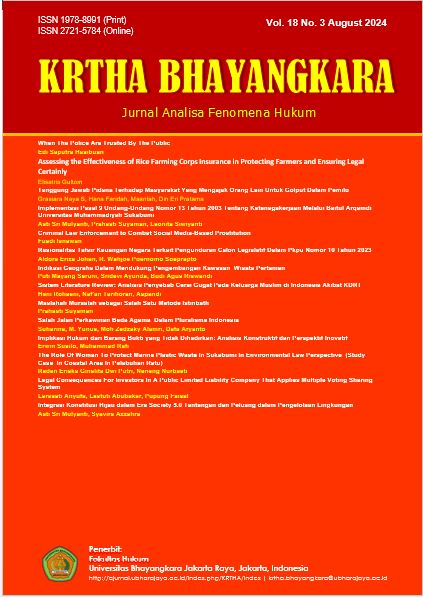Comparison Of Indonesian Police With Asian Police (Japan, South Korea, And Singapore)
DOI:
https://doi.org/10.31599/krtha.v19i2.4326Keywords:
Indonesian Police, Asian Police, Police Reform, System Comparison, Best PracticesAbstract
This study aims to analyze and compare the institutional structure, functions, and authorities of the Indonesian National Police (Polri) with those of three Asian countries: Japan, South Korea, and Singapore. This study is motivated by various problems still faced by the Polri, including declining public trust due to several cases of violence by officers, such as the death of Afif Maulana, the shooting of Gamma Rizkynata, and internal conflict between Polri members in South Solok. The research method used is a juridical-normative with a comparative approach, through document studies, regulatory analysis, and a review of the latest literature. The results show that the police systems in Japan, South Korea, and Singapore have advantages in terms of accountability, transparency, and a stricter internal oversight system compared to Indonesia. In addition, these three countries have also demonstrated consistency in maintaining the independence of officers and providing human rights-oriented training. Meanwhile, the Polri still faces challenges in terms of structural reform, strengthening ethical culture, and apparatus professionalism. Therefore, it is necessary to adopt best practices from these countries to strengthen the Indonesian National Police as an effective, professional and publicly trusted law enforcement institution.
Downloads
References
Akhir Tahun 2024, Polri Dapat Sorotan. Koma.id, 15 Desember 2024
Aseanapol, Modernization of Police Forces in Southeast Asia, (Jakarta: Aseanapol Secretariat, 2024),
Bayley, D.H. (2022). Police for the Future. Oxford University Press.
Chew, B. (2023). “Singapore’s Internal Affairs Model: A Comparative Review.” Asian Journal of Public Administration, 19(1), 95–112
Choi Jin-Wook, “Police Reform in Korea: Challenges and Successes,” Asian Policing Journal, Vol. 4, No. 2 (2022): 105.
Fajar, M. (2023). Reformasi Kepolisian dan Tantangan Demokrasi. Jakarta: LP3ES.
Hasibuan, E. S. (2023). Reformasi Polri: Menilik Keberhasilan Program Presisi Polri. Krtha Bhayangkara, 17(3)
Hasibuan, E. S., & SH, M. (2021). Hukum kepolisian dan criminal policy dalam penegakan hukum. PT. RajaGrafindo Persada-Rajawali Pers.
Hasibuan, E. S., & SH, M. (2023). Wajah polisi presisi: melahirkan banyak inovasi dan prestasi. PT. RajaGrafindo Persada-Rajawali Pers.
ICW, Laporan Tahunan Transparansi dan Pengaduan Lembaga Negara Tahun 2024, (Jakarta: ICW, 2025), hlm. 12.
Ito, Y. (2023). “Public Safety Commissions and Democratic Police Oversight in Japan.” Journal of Asian Legal Systems, 11(1), 88–104.
Johnston, L. (2024). Comparative Policing in Asia. Cambridge University Press.
Kapolri: 2.341 Polisi Bermasalah di 2024, Terbanyak Turunkan Martabat. Suara.com, 31 Desember 2024.
Kasus Kematian Afif Maulana, Komnas HAM Turun Tangan, Kompas.com, 18 Juni 2024
Kim, H. (2023). "Cybersecurity and Korean Law Enforcement," Asian Journal of Law and Society, 10(1).
Kim, J. S. (2023). “Digital Oversight: Technology-Driven Police Accountability in South Korea.” Asian Journal of Law and Society, 10(2), 111–130.
Kompol Tewas Ditembak Rekan Sendiri di Solok Selatan, CNN Indonesia, 4 Januari 2025.
Korean National Police Agency. (2023). Public Order and Safety System. https://www.police.go.kr
Lee, H. K. (2020). The Evolution of Police Accountability in Korea: A Legal Perspective. Seoul: Korea Institute for Public Administration.
Lee, J. (2022). Democracy and the Police in South Korea. Seoul: Yonsei Press.
Lim, T. Y. (2024). “Professionalism and Integrity in the Singapore Police Force.” Journal of Asian Governance, 6(3), 214–233.
Nakahara, K. (2021). Kōban System and Public Trust: A Japanese Experience. Tokyo: Legal Studies Review
National Police Agency of Korea, "Organizational Structure," NPA Korea.
NPA Japan. (2023). Community Policing in Japan. https://www.npa.go.jp
Park, D. (2024). “Police, Human Rights, and Democratic Accountability in Korea.” Korean Journal of Legal Reform, 8(2), 51–75.
Polisi Tembak Siswa SMK, Fakta Baru Terungkap, Tempo.co, 5 Januari 2025.
Singapore Police Force, "Structure and Organization," SPF.
Singapore Police Force. (2024). Annual Report on Security and Law Enforcement. https://www.spf.gov.sg
Supriyadi, Y. (2022). Reformasi Polri dan Tantangan Akuntabilitas Kelembagaan. Jakarta: Pustaka Hukum.
Tan, E. (2022). "Smart Surveillance in Singapore," Journal of Asian Criminology, 17(3).
Tanaka, M. (2022). “Community Policing and Civil Accountability in Japan.” Asian Journal of Criminology, 17(1), 45–62.
Undang-Undang Nomor 2 Tahun 2002 tentang Kepolisian Negara Republik Indonesia, Pasal 2–13.
Undang-Undang Nomor 2 Tahun 2002 tentang Kepolisian Negara Republik Indonesia.
Wong, A. (2021). Law Enforcement and Public Trust in Singapore: The Role of Internal Oversight. Singapore: National University Press.
Yamamoto, H. (2021). Police Oversight in Japan: Civilian Control and Community Engagement. Tokyo University Press
Downloads
Published
Issue
Section
License
Copyright (c) 2025 Edi Saputra Hasibuan

This work is licensed under a Creative Commons Attribution 4.0 International License.


.jpg)









